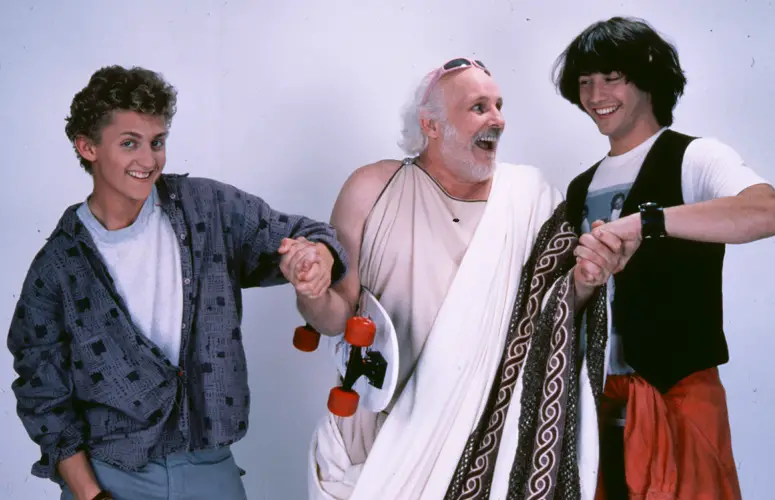It could be argued that these are challenging times for the cinephile. For those seeking films that offer novel stories rich with complex characters and themes, it is lucky that the internet has provided us with access to the work of independent directors or old movies that have fallen by the wayside, because these days all Hollywood seems to offer is an endless deluge of lukewarm sequels and reboots. As a result, movie buffs hungry for something better are forced to dig deep.
But every once in a while, this mania for sequels gives us something we actually want. In this case I am referring to Bill & Ted Face the Music, which is slated to come out next year. Excellent.
…beneath all the silliness is a well-crafted extolment on the philosophy of Stoicism.
While it would be easy to dismiss the first two Bill & Ted movies as goofy ’80s pulp, I would like to take a moment to argue that there is more depth to the adventures of Wyld Stallyns than meets the eye. Upon repeat viewings (and I have repeated many, many times), it becomes clear that beneath all the silliness is a well-crafted extolment on the philosophy of Stoicism.
In a nutshell, the Stoics of Ancient Greece believed that happiness or at least contentment is best achieved through the acceptance of the situation as the situation stands, even and perhaps especially when one is presented with dire circumstances. In other words, it’s Hemingway’s concept of “grace under pressure.” An extension of this philosophy involved the assertion that the greatest possible outcome is achieved when people treat one another with fairness and justice.
Let’s take a look at how these ideals are presented through the lens of Bill & Ted’s Excellent Adventure.
Goofy Grace Under Pressure
For starters, our titular characters begin their heroes’ journey when an agent of fate in the form of Rufus (RIP George Carlin) falls from the sky in a phone booth and casually announces that he’s come from the future, and that Bill and Ted are needed to save the universe. The boys are relatively unruffled by this extraordinary event.
As the movie progresses, we never see Bill and Ted lose their cool regardless of the challenges thrown their way. A looming threat of military school. The time traveling phone booth breaks down. Their companions from throughout history get thrown in jail. Their response is always the same: Bogus—let’s find a solution.

Speaking of Stoics…
Now, who did Bill and Ted gather over the course of their journey? Napoleon, Joan of Arc, Billy the Kid, Lincoln, etc., etc., and—most telling of all—Socrates.
Each of these figures is renowned for displaying stoicism in their own way, but Socrates stands out due to the fact that he is the most prominent stoic philosopher of all time. What’s more, of all the people they’ve snatched from history, Bill and Ted spend the majority of their adventure with Socrates, and his clownish portrayal is closely aligned with their silly behavior.
…Socrates serves as a philosophical mirror to Bill and Ted. They are cut of the same cloth.
This is not an accident. Through the logic of association, Socrates serves as a philosophical mirror to Bill and Ted. They are cut of the same cloth.
Then there is a compliment Bill pays to Billy the Kid: “You are dealing with the oddity of time travel with the greatest of ease.” This is a nod to the cowboy’s stoic acceptance of his most unusual circumstances.
Oftentimes stoicism is associated with the concept of fearlessness in the face of death. On that note, consider the first B&T sequel in which they literally befriend Death, who eventually joins their band.
With all his talk of war and bullfighting, Hemingway might have thought himself the ultimate stoic, but Bill and Ted have him beat. They had Death backing them up on bass.
Be Excellent to Each Other
Now let’s look at another aspect of the stoic philosophy, which dictates that all should be treated with equity.
The movie states this concept quite plainly. When Bill and Ted find themselves in the future, they deliver the message, “Be excellent to each other.” This becomes one of the central principals around which the harmonious future society of the film establishes itself.
Perhaps now is the perfect time for the return of Bill and Ted, for these days it seems like we could all glean some guidance from their example. When life becomes chaotic and the worst is thrown your way, ask yourself: What would Bill and Ted do?
Their prescription:
- Keep a cool head.
- Look for solutions.
- Maintain your sense of humor.
- Be excellent to each other.
Oh, and let’s not forget—party on, dudes.




